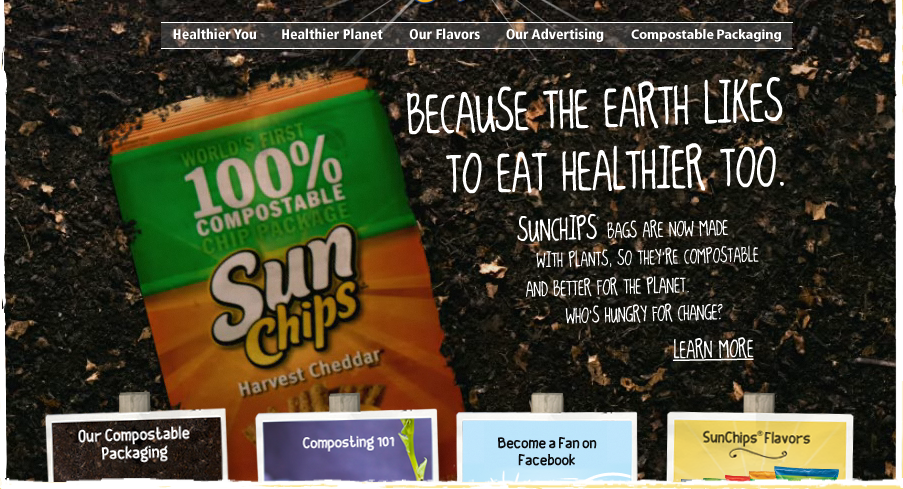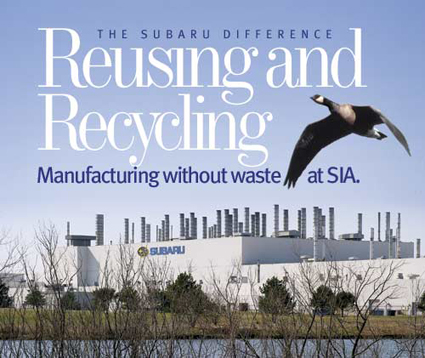SunChips chooses transparency to market its new 100% compostable bag.
Last year, I wrote about SunChips’ “compostable” chip bag that wasn’t really compostable at all. It was one-third compostable, which meant that its compostable layer was laminated to two-thirds non-compostable layers, rendering it — well — noncompostable.
Now that’s changed. SunChips bags are now 100% compostable and designed to fully break down in just 14 weeks when placed in a hot, active compost bin or pile. (Watch the bag “decompose.”)
I like what the company has done, because it has made its testing process transparent. Rather than a “take our word for it” policy, it’s produced a PDF on the behind-the-scenes work on its product development and testing. Brilliant.
It even discloses the labs it worked with and the results of its testing over time. It discussed the first set of tests under aerobic compost conditions, later testing if they maintained the composting ingredients but did not control the temperature, and so on.
If you’re a composting geek, this is for you. Even if you aren’t, I love the idea here. From a marketing perspective, transparency creates a level of trust. Trust creates long-term loyalty. Transparency and fact-filled PDFs also make for great blog and marketing fodder — making viral marketing easy.
In its materials, SunChips also talks about other changes it has made to reduce the amount of raw materials used in the first place. These include package size optimizations, film thickness improvements, and seal changes. According to SunChips, this has resulted in reducing the amount of packaging material required by 5 million pounds over five years.
This is a company that has not only given legs to its corporate environmental commitment, but it’s used it to create brilliant viral marketing campaigns. Kudos!





I thought of an interesting way to have companies create more environmentally friendly packaging – have legislators pass a "packaging footprint" bill.
If you think about products you purchase, like food, it contains the nutritional information, ingredients, etc. so that you are aware of what you are putting into your body. I think the same should go for what we are putting in the ground.
Packages should detail how long it will take for their packaging materials to decompose so that consumers could make more informed decisions regarding their purchases, and in my opinion, a measure like this would also encourage manufacturers to create more environmentally packaging, which would translate into cheaper packaging…
I have been working on this proposal in my spare time and think it would be a perfect "outside-the-box" method of preserving the environment, with minimal costs (just the added ink to print the words on the packaging and maybe a little bit of research to find out the environmental damage the manufacturer will cause with their packaging materials).
Another bonus is that with non-petroleum based materials on the rise, this kind of action could contribute in weening America off of foreign oil…
Feel free to contact your elected officials regarding this…
I thought of an interesting way to have companies create more environmentally friendly packaging – have legislators pass a "packaging footprint" bill.
If you think about products you purchase, like food, it contains the nutritional information, ingredients, etc. so that you are aware of what you are putting into your body. I think the same should go for what we are putting in the ground.
Packages should detail how long it will take for their packaging materials to decompose so that consumers could make more informed decisions regarding their purchases, and in my opinion, a measure like this would also encourage manufacturers to create more environmentally packaging, which would translate into cheaper packaging…
I have been working on this proposal in my spare time and think it would be a perfect "outside-the-box" method of preserving the environment, with minimal costs (just the added ink to print the words on the packaging and maybe a little bit of research to find out the environmental damage the manufacturer will cause with their packaging materials).
Another bonus is that with non-petroleum based materials on the rise, this kind of action could contribute in weening America off of foreign oil…
Feel free to contact your elected officials regarding this…
It's a great idea. The question is the burden that it would place on small businesses to assess the footprint of all of their packages. Have you looked into how much time and cost there is associated with determining an accurate carbon footprint for a package?
It's a great idea. The question is the burden that it would place on small businesses to assess the footprint of all of their packages. Have you looked into how much time and cost there is associated with determining an accurate carbon footprint for a package?
Another lousy attempt at greenwashing and this blog is part of the problem with these misleading articles of trash – no pun intended. Of course the article doesn't mention the fact that Frito-Lay uses cancer causing genetically modified corn! Forget the Earth's health! What about mine!
You guys should do more due diligence before posting articles of mass destruction.
Another lousy attempt at greenwashing and this blog is part of the problem with these misleading articles of trash – no pun intended. Of course the article doesn't mention the fact that Frito-Lay uses cancer causing genetically modified corn! Forget the Earth's health! What about mine!
You guys should do more due diligence before posting articles of mass destruction.
These guys are totally biodegradable and compostable.
http://www.biometechnologiesplc.com
These guys are totally biodegradable and compostable.
http://www.biometechnologiesplc.com